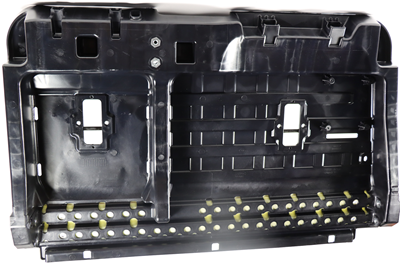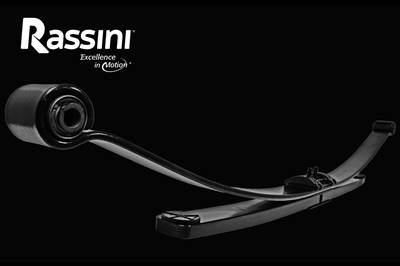Altair announces 12th annual Enlighten Award winners
Companies like Syensqo, Weav3D, Toyota, CompositeEdge and Teijin Automotive Technologies are recognized for their composites-forward approaches to more sustainable, energy-efficient automotive efforts.
Altair (Troy, Mich. U.S.) has named the winners of the 2024 Altair Enlighten Award. Presented in association with the Center for Automotive Research (CARAnn Arbor, Mich., U.S.), the award honors the greatest sustainability and lightweighting advancements that successfully reduce carbon footprint, mitigate water and energy consumption, and leverage material reuse and recycling efforts.
Throughout its 12-year history, the Enlighten Award has been recognized by EV Magazine as a top 10 sustainability award in 2024. “The Enlighten Award is the leading award highlighting the automotive industry’s finest innovations in sustainable technology. We are thrilled to once again recognize the organizations creating a more sustainable future,” says James R. Scapa, founder and CEO, Altair.
“Each edition of the Enlighten Award showcases the products, processes and organizations that are ushering in the next generation of groundbreaking automotive technology,” says Alan Amici, president and CEO, CAR. “We cannot wait to recognize this year’s winners, and we are once again thrilled to present this award in conjunction with Altair and the rest of our valued partners.”
Below is the complete list of all winning organizations, runners-up and honorable mentions (see Altair’s 2022 Enlighten Awards):
Sustainable Product – Winner: DuPont (Auburn Hills, Mich., U.S.) – Betamate Broad Bake Adhesive Technology
-
DuPont Betamate broad bake adhesive technology helps reduce energy use and greenhouse gas emissions during vehicle body manufacturing by enabling adhesives to cure at lower temperatures, thus saving energy via reduced e-coat oven temperatures and shorter oven cycle times. The technology can also eliminate the need for cold storage due to a formulation that extends shelf life.
Sustainable Product – Runner-up: Bridgestone Americas (Woodridge, Ill., U.S.) – Turanza EV Tire
-
The Turanza EV grand touring tire is manufactured with 50% renewable and recycled materials — said to be one of the highest percentages among commercially available replacement tires — and features Bridgestone Enliten technology to optimize performance and improve tire life span. By 2050, Bridgestone is aiming for all their tires to be composed of 100% renewable and recycled materials.
Sustainable Process – Winner: BMW M GmbH (Munich, Germany), AMC GmbH (Hamburg, Germany), Bcomp Ltd. (Fribourg, Switzerland), Gradel Lightweight Sàrl (Bommel, Luxembourg) and Lasso Ingenieurgesellschaft (Leinfelden-Echterdingen, Germany)– BMW M Visionary Materials Seat
-
The BMW M Visionary Materials Seat focuses on circular design principles and sustainable materials. The seat features a monomaterial lightweight design that emphasizes using sustainable, renewable materials such as recycled polyester textile, flax fiber biocomposite and biogene leather alternatives. Where possible, petrol-based raw materials through bio-based materials were made from algaes and plant-based fillers — such as chalk and cork. The composite can be made from carbon, basalt, glass fiber or natural fibers as needed.
Sustainable Process – Runner-up: PPG IndustriesToyota Motor Manufacturing Canada (Cambridge, Canada) and (Wallingford, Conn., U.S.) – Epic200X Electrocoat
-
The Epic200X electrocoat can enhance corrosion protection for automotive bodies while reducing environmental impact. At the Toyota facility, the product and application process is said to enable a total reduction of 3,500 metric tons of CO2 emissions per year. More specifically, the product can reduce the amount of applied product by vehicle by 0.6 kilograms, while this application process can save 5,626,000 kilowatt-hours of energy and 1,843,000 gallons of water per year.
Module Lightweighting – Winner: Syensqo (Brussels, Belgium) and General Motors (Detroit, Mich., U.S.) – High-Performance Thermoplastic Battery Module Structure
-
Syensqo and General Motors have collaboratively designed a high-performance thermoplastic battery module structure that is said to deliver a 37% weight reduction and a 25% cost savings compared to traditional aluminum. According to the companies, key features include enhanced vehicle performance through precision injection molding, streamlined component consolidation for simplified assembly and a cell-lock feature that stabilizes battery cells. Additionally, the design can eliminate multiple components and processes, further optimizing efficiency.
Module Lightweighting – Runner-up: Toyota Motor Co. (Aichi, Japan), US Farathane (Auburn Hills, Mich., U.S.) and BASF Corp. (Charlotte, N.C., U.S.) – Toyota Tacoma Second-Row Composite Seat Structure
-
The Toyota Tacoma second row comprise seat structure features 30% less mass than the previous generation of steel seats and 20% less mass than the current resin seats seen in the 2022 Toyota Tundra. In addition, this seat structure consolidated more than 55 parts into just four parts that take little time to be injection molded and shipped.
Enabling Technology – Winner: CompositeEdge GmbH (Braunschweig, Germany) – Next-Gen Sustainable High-Performance Structures
-
Aiming to minimize overall material use, CompositeEdge GmbH uses natural fiber composites — such as flax and hemp fiber — blended with plastic to form high-performance structures that can support the automated manufacture of car body panels, interior trims, chassis parts, suspension elements and more without additional adhesives. The use of natural fiber composites significantly reduces carbon emissions and energy consumption compared to synthetic materials. Overall, the technology enables the production of sustainable, lightweight automotive components.
Enabling Technology – Runner-up: Teijin Automotive Technologies (Auburn Hills, Mich. U.S.) – Fully Automated Preforming Process Enabling Complex CFRP Part
-
Teijin Automotive Technologies’ fully automated preforming process enables the mass production of carbon fiber preforms to be used in automotive components — in this case a vehicle door. The precision of the automated process optimizes the amount of material used and recycles a small amount of offal (waste). The previous labor-intensive process was said to be unsuitable for mass production and often resulted in avoidable waste due to human error. According to the company, this process is more efficient, reducing required labor by 20%.
Enabling Technology – Honorable mention: Bemis Manufacturing Co. (Sheboygan Falls, Wis., U.S.) and BASF Corp. (Charlotte, N.C., U.S.) – Large Hydraulic Tanks for Compact Excavators via BASF’s Ultramid Polyamide
Bemis Manufacturing Co.'s large hydraulic tanks for compact excavators via BASF Corp.’s Ultramid polyamide.
-
Bemis Manufacturing Co. and BASF Corp. developed large hydraulic tanks for compact excavators using BASF’s Ultramid polyamide — delivering a 15% reduction in life cycle CO2 emissions. In addition, by combining injection molding and vibration welding, the approach resulted in 5% mass savings and 20% lower costs compared to traditional rotomolding.
Future of Lightweighting – Winner: WEAV3D (Norcross, Ga., U.S.), Braskem (São Paulo, Brazil) and Clemson Composites Center (Greenville, S.C., U.S.) – Cost-Effective Lightweight Vehicle Body Structures
-
WEAV3D, Braskem and the Clemson Composites Center developed a composite lattice-reinforced polypropylene sheet tailorable to match the performance of any vehicle body structure on the market. Manufactured with a high-rate, highly automated forming cycle that produces more parts using less energy, this sheet costs 50% less and weighs 23% less than CFPA6 organosheet (nylon 6) and weighs between 60-70% less than steel. The material is also said to have a 62% reduction in trim scrap by weight. Lastly, compared to steel, the polypropylene sheet can provide optimal energy absorption and shape recovery.
Future of Lightweighting – Runner-up: Carsolia Composites Corp. (Cookstown, Ontario, Canada) – Composite Suspension Coil Spring by Carsolia
-
Carsolia Composites Corp. introduces a patent-pending composite coil spring that’s said to be 50% lighter than steel. The carbon fiber composite material also has 50% less CO2 equivalent per kilogram versus steel, which results in a 75% overall reduction of CO2 emissions. Manufactured with an efficient production process that supports high-volume vehicle production, the spring also enables custom appearance design possibilities that were previously impossible. Suited for battery electric vehicle (BEV) platforms, it is intended to be a direct replacement for current vehicles as a "bolt-on solution" — no redesign needed.
Responsible AI – Winner: Dow Inc. (Midland, Mich., U.S.) – Sustainable SpecFlex Polyurethane Solutions
-
Dow Inc.’s sustainable SpecFlex polyurethane solutions focus on developing and using cleaner raw materials and distinctive design principles to optimize performance. Achieving equivalent mechanical and aging properties compared to traditional formulations, these solutions are said to be safer and more sustainable — with more than 50% lower total volatile organic compounds (VOCs), 60% lower formaldehyde and 80% lower acetaldehyde. Moreover, an AI aldehyde predictive model can accelerate market response by capturing the factors contributing to odor and translating complicated non-linear features into real-world related performance features, enabling outcome prediction.
The Enlighten Award winners were announced in an awards ceremony at the CAR Management Briefing Seminars this morning at 8:00 a.m. EDT. For more information about the Enlighten Award, visit this link.
Partners for the 2024 Enlighten Award include Auto Bild Japan, Autocar Professional, Automobil Industrie, Auto Messe Web, Auto Messe Web Worldwide, CAR, Google Cloud, Korean Society of Automotive Engineers (KSAE), SAE Automotive Engineering and Tech Briefs.
Related Content
McLaren celebrates 10 years of the McLaren P1 hybrid hypercar
Lightweight carbon fiber construction, Formula 1-inspired aerodynamics and high-performance hybrid powertrain technologies hallmark this hybrid vehicle, serve as a springboard for new race cars.
Read MoreCarbon fiber, bionic design achieve peak performance in race-ready production vehicle
Porsche worked with Action Composites to design and manufacture an innovative carbon fiber safety cage option to lightweight one of its series race vehicles, built in a one-shot compression molding process.
Read MoreCo-molding SMC with braided glass fiber demonstrates truck bed potential
Prepreg co-molding compound by IDI Composites International and A&P Technology enables new geometries and levels of strength and resiliency for automotive, mobility.
Read MoreJeep all-composite roof receivers achieve steel performance at low mass
Ultrashort carbon fiber/PPA replaces steel on rooftop brackets to hold Jeep soft tops, hardtops.
Read MoreRead Next
Toyota Tundra composite seatback design awarded 2022 Altair Enlighten Award
BASF, Flex-N-Gate, L&L Products and Toyota limited an all-steel assembly, cutting 60 parts down to four composite pieces for 20% weight savings.
Read MoreAZL Aachen announces new project on composite rotor sleeves
Joint Partner Project aims to address the growing demand for more efficient, powerful and compact electric motors in mobility and industrial applications.
Read MoreAltair's 9th Enlighten Award winners feature vehicle lightweighting, sustainability
Annual award honors advancements in reducing the carbon footprint, mitigating water and energy consumption, promoting material reuse and recycling and applying composites for lightweighting.
Read More








































